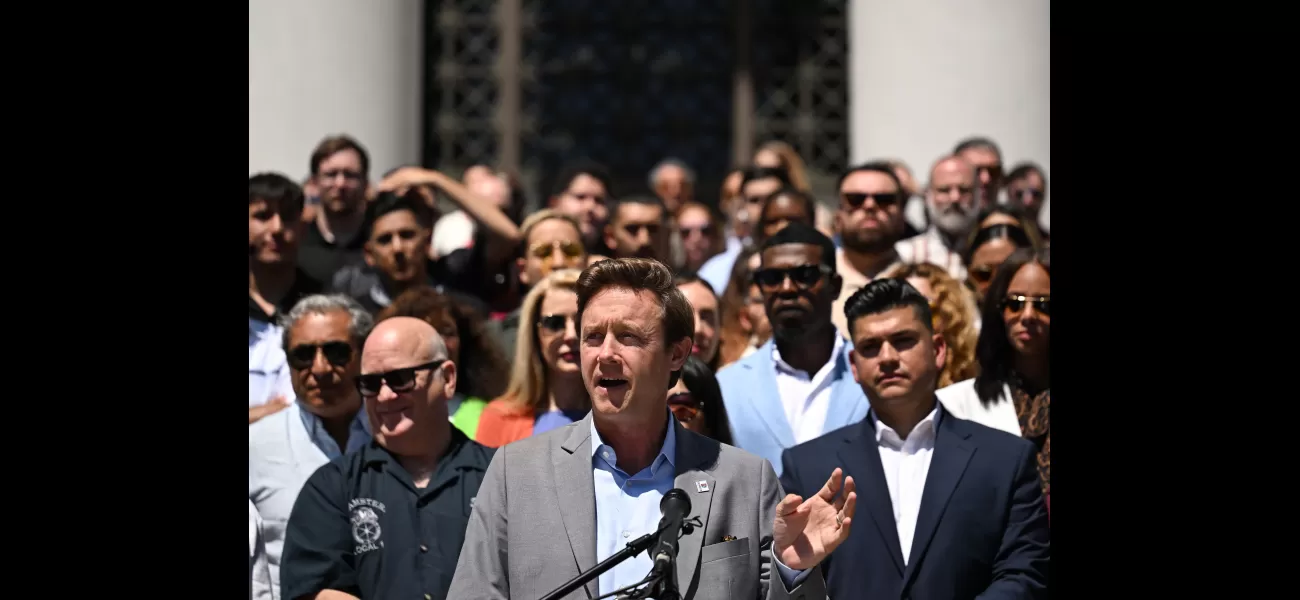Denver residents to vote on city's biggest sales tax in November.
City Council members who were unsure about the details of the Affordable Denver sales tax plan are now willing to let voters make the decision due to the pressing housing needs in their districts.
August 20th 2024.

In November, the residents of Denver will have a say in the city's history as they vote on the largest dedicated sales tax proposed by the City Council. The Council voted 9-4 to refer a 0.5% tax hike to the ballot, aimed at significantly increasing the amount of affordable housing in the city. This decision now rests in the hands of the citizens of Denver, living in a city that has quickly become one of the most expensive housing markets in the United States. They will have to decide whether or not to add this half-percent on top of the existing 8.81% effective sales tax rate.
One of the Council members, Darrell Watson, emphasized the importance of taking action during the voting process. He voted with the majority, stating that now is the time to make a change. However, the specific details of how the estimated $100 million in annual tax revenue will be invested each year, if the measure is passed, are yet to be determined.
Mayor Mike Johnston and other supporters on the Council have discussed investing in programs such as rental assistance and downpayment assistance to help lower-income individuals and families afford housing. The idea of the city becoming an equity investor in new developments has also been proposed, giving city leaders a say in the number of affordable apartments and the prices of rents for those on the lower end of the income spectrum.
During the Council's meeting on Monday, several amendments were adopted, including one that clarifies the Council's role in approving the first-year spending plan for the fund in January. This also solidifies the Council's authority to approve prioritization plans for future years. Even Council members who had concerns about the lack of clarity in the proposal stated that they see the urgent need for affordable housing in their districts and are ready to let the voters decide.
One member who changed her vote was Jamie Torres, who expressed her support for the measure going to the voters. However, she also acknowledged the lack of specificity in the proposal and the need for more clarity. She was among those who wanted assurance that the tax revenue would be used to support Denverites who are in the greatest need for affordable housing, specifically those making 80% of the area median income or below.
Another concern that was addressed through an amendment was the area median income limits. The change mandates that the tax revenue can only be used to support projects and programs that serve renters making 80% of the area median income or below. Mixed-income developments may still qualify for support from the fund if the average cost of units in that development is available to renters making 100% of the area median income or below.
The Council also approved a sunset date for the tax, meaning it will expire on December 31, 2064 unless the Council or voters intervene. Despite this addition, four Council members voted against sending the measure to the ballot. Their main concerns were the lack of public input and the potential burden on low-income Black and Latino families.
One of the Council members, Kevin Flynn, has been opposed to the tax increase since before it was officially proposed by the mayor. He believes that raising the cost of living in Denver will not make the city more affordable. If both the proposed sales tax increase for affordable housing and the already approved sales tax increase for Denver Health pass, Denver's cumulative sales tax rate will be one of the highest in the state.
However, even Council members who have concerns about the two measures competing with each other recognize that having stable housing is crucial for public health. Councilman Chris Hinds, who received life-saving care at Denver Health, acknowledged this link as well.
Mayor Johnston was still at City Hall following the vote and credited the five Council sponsors of the referral measure for their work in passing amendments that helped get the measure passed. He believes that this fund will make a significant impact in Denver, providing 45,000 units of affordable housing and serving people at all levels of need across the city. He hopes that it will make Denver a city where even a second-grade teacher can afford to live in the neighborhood where they work.
As the November voting approaches, the mayor will be discussing the details of the Affordable Denver fund and how it will benefit the city. He believes that Denver has the potential to be the fastest-growing economic engine in the country while also being a place where people can still afford to live. Stay informed with Colorado Politics by signing up for their weekly newsletter, The Spot.
One of the Council members, Darrell Watson, emphasized the importance of taking action during the voting process. He voted with the majority, stating that now is the time to make a change. However, the specific details of how the estimated $100 million in annual tax revenue will be invested each year, if the measure is passed, are yet to be determined.
Mayor Mike Johnston and other supporters on the Council have discussed investing in programs such as rental assistance and downpayment assistance to help lower-income individuals and families afford housing. The idea of the city becoming an equity investor in new developments has also been proposed, giving city leaders a say in the number of affordable apartments and the prices of rents for those on the lower end of the income spectrum.
During the Council's meeting on Monday, several amendments were adopted, including one that clarifies the Council's role in approving the first-year spending plan for the fund in January. This also solidifies the Council's authority to approve prioritization plans for future years. Even Council members who had concerns about the lack of clarity in the proposal stated that they see the urgent need for affordable housing in their districts and are ready to let the voters decide.
One member who changed her vote was Jamie Torres, who expressed her support for the measure going to the voters. However, she also acknowledged the lack of specificity in the proposal and the need for more clarity. She was among those who wanted assurance that the tax revenue would be used to support Denverites who are in the greatest need for affordable housing, specifically those making 80% of the area median income or below.
Another concern that was addressed through an amendment was the area median income limits. The change mandates that the tax revenue can only be used to support projects and programs that serve renters making 80% of the area median income or below. Mixed-income developments may still qualify for support from the fund if the average cost of units in that development is available to renters making 100% of the area median income or below.
The Council also approved a sunset date for the tax, meaning it will expire on December 31, 2064 unless the Council or voters intervene. Despite this addition, four Council members voted against sending the measure to the ballot. Their main concerns were the lack of public input and the potential burden on low-income Black and Latino families.
One of the Council members, Kevin Flynn, has been opposed to the tax increase since before it was officially proposed by the mayor. He believes that raising the cost of living in Denver will not make the city more affordable. If both the proposed sales tax increase for affordable housing and the already approved sales tax increase for Denver Health pass, Denver's cumulative sales tax rate will be one of the highest in the state.
However, even Council members who have concerns about the two measures competing with each other recognize that having stable housing is crucial for public health. Councilman Chris Hinds, who received life-saving care at Denver Health, acknowledged this link as well.
Mayor Johnston was still at City Hall following the vote and credited the five Council sponsors of the referral measure for their work in passing amendments that helped get the measure passed. He believes that this fund will make a significant impact in Denver, providing 45,000 units of affordable housing and serving people at all levels of need across the city. He hopes that it will make Denver a city where even a second-grade teacher can afford to live in the neighborhood where they work.
As the November voting approaches, the mayor will be discussing the details of the Affordable Denver fund and how it will benefit the city. He believes that Denver has the potential to be the fastest-growing economic engine in the country while also being a place where people can still afford to live. Stay informed with Colorado Politics by signing up for their weekly newsletter, The Spot.
[This article has been trending online recently and has been generated with AI. Your feed is customized.]
[Generative AI is experimental.]
0
0
Submit Comment





